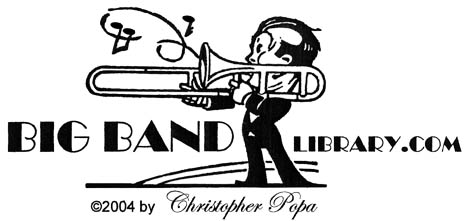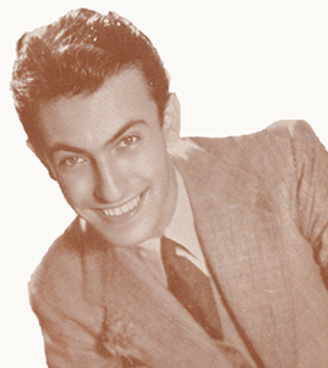
For more than a decade afterwards, Duchin and his orchestra performed at leading hotels and other venues across the country, including six years in the Persian Room of the Hotel Plaza in New York City, and at the Blackstone, Palmer House, and Edgewater Beach Hotel in Chicago.
They also played at President Franklin D. Roosevelt's inaugural ball, in 1933.
It was reported in 1940 that Duchin's fingers were insured for $150,000.
vital stats:
given name Edwin Frank Duchin
birth Apr. 1, 1909, Cambridge, MA
death Feb. 9, 1951, New York City, leukemia
father Frank Duchin, a pharmacist and owner of several drug stores in Boston
mother Tillie Baron Duchin
sister Mrs. Benjamin Slate
education graduate, Beverly High School, Beverly, MA; Ph.G. degree, Massachusetts
College of Pharmacy, 1929
first wife Marjorie Oelrichs, an heiress, b.June 23, 1908, m.June 5, 1935, d.Aug. 3, 1937
son Peter Oelrichs Duchin, b.Jul. 28, 1937
second wife Maria Theresa Winn, m.Nov. 2, 1947
military service U.S. Navy, 1942-1945
hobbies sports (including the Boston Red Sox baseball team)
physical description height: 6 ft. 1/2 in.; hair: black; eyes: gray
residence 16 E. 81st St.
Members of Duchin's band included, at different times, Lew Sherwood, trumpet and vocals; Charlie Trotta, trumpet; Andy Wiswell or Moe Zudecoff (aka "Buddy Morrow"), trombones; Johnny McAfee, saxophone; and Buddy Clark or The DeMarco Sisters, vocals.
Between 1932 and 1950, Duchin recorded for, variously, the Columbia, Brunswick, and Victor labels and was credited for introducing to the public the songs Stormy Weather and Old Man Mose.
Other popular discs by his band included Did You Ever See a Dream Walking?, Let's Fall in Love, I Won't Dance, Lovely to Look At, You Are My Lucky Star, Moon Over Miami, Lights Out, Take My Heart, It's De-Lovely, and I'll Sing You a Thousand Love Songs, each of which was reported as a #1 record.
When they made two Harold Arlen songs, Ill Wind (You're Blowing Me No Good) and As Long As I Live, on February 28, 1934 at Victor, the composer himself served as vocalist.
Duchin enlisted in the Navy in 1942 and requested combat duty. Because he had perfect pitch, he was trained in the use of submarine-detecting devices at the Naval Training School at Northwestern University in Illinois and at a Submarine Chaser School. After a few months' service on patrol boats, he attended Sound School and was then assigned to Destroyer Escort work as a Sound Officer and took part in the D-Day operations off Normandy in 1944. His ship also participated in Third Fleet Pacific operations, including the Iwo Jima and Okinawa invasions. After a course at the Commanding Officers' School at Pearl Harbor in Hawaii, Duchin was named Operations Officer for a destroyer squadron and, at the end of 1945, was discharged as a Lieutenant Commander.
He underwent several months' treatment for leukemia beginning in late 1950.
The morning of his death, Duchin received a citation for meritorious service in the second World War from Rear Admiral Walter S. Delaney, commandant of the Third Naval District.
In 1956, five years after Duchin passed away, a movie was made based on his life, "The Eddy Duchin Story," starring Tyrone Power and featuring a soundtrack performed by fellow pianist-bandleader Carmen Cavallaro.
Following service in the U.S. Army, Duchin's son, Peter, carried on in music as a society pianist and orchestra leader, based in New York City.
In 1974, the New York Times stated that, "As a rule, Peter Duchin's Orchestras, Inc. charges $5,000 for a 12-piece group without Peter, $10,000 when he appears with the orchestra, and $15,000 when Peter and the band play an engagement away from New York (the additional money earmarked for travel and expenses).
That's a lot more than someone who worked in a pharmacy could make!
sources:
"Duchin, Eddy," in Current Biography 1947 (New York City: H.W. Wilson Co., 1948),
pp.179-181.
"Eddy Duchin Dies of Leukemia At 41: Pianist and Orchestra Leader Won Popular Acclaim
With Renditions of the Blues," New York Times, Feb. 10, 1951, p.11.
"Eddy Duchin Will Filed," New York Times, Feb. 22, 1951, p.25.
Peter Duchin with Charles Michener, Ghost of a Chance: A Memoir (New York City:
Random House, 1996).
"Eddy Duchin's Son On TV," Chicago Tribune, Aug. 30, 1959.
Charles Garrod, Eddy Duchin and His Orchestra (Zephyrhills, FL: Joyce Record Club,
1989).
Brian Rust, "Eddy Duchin," in The American Dance Band Discography 1917-1942:
Volume I Irving Aaronson to Arthur Lange (New Rochelle, NY: Arlington House Publishers,
1975), pp.458-467.
Sandra Shevey, "Eddy Duchin's Son, Peter, Society's Darling of the Keyboard," New York
Times, May 19, 1974, p.1F.
Joel Whitburn, "Eddy Duchin & His Orchestra," in Joel Whitburn's Pop Memories 1890-1954:
The History of American Popular Music (Menomonee Falls, WI: Record Research, Inc.,
1986), pp.140-142.
I would like to expand this tribute with, if possible, a new interview of someone who was important to Eddy Duchin's life or career. Are you an alumnus of his band, a member of his family, or a collector who is knowledgeable about his accomplishments? Please contact me via e-mail
return to "Biographical Sketches" directory
go to Big Band Library homepage
The big bands are back
in a new and exciting way!
EDDY DUCHIN
"SOFT LIGHTS
AND SWEET MUSIC"
by Music Librarian CHRISTOPHER POPA
April 2009
When his mother started him at the piano, he showed "no marked propensity" for the instrument. It was only after his routine exercises gave way to more advanced etudes and other pieces that his interest was aroused.
At the same time, his father encouraged him to pursue a career as a pharmacist. But once young Duchin saw that playing at weddings and dances would earn him more money, he decided in favor of music.
On Labor Day, 1931, he debuted a band at the Central Park Casino in New York City, and became quite popular, particularly with the society set and dilettantes.
